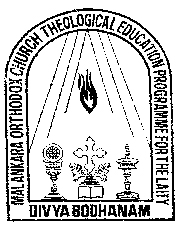Divyabodhanam FAQ

Divyabodhanam
Growing in the Wisdom of God
(Theological Education Programme for the Laity)
1. Why Divyabodhanam Study is needed?
It is always a plus credit to get a diploma certification from the Church, but more than that, Many times we do not have a proper answer for the many things we see around us in the Church. As a result, we are alienated from the Church.
By going through the process of Divyabodhanam, we will have a good foundation about important topics in the faith like New Testament, Old Testament, Sacraments, ministries of the Church, Traditions, Liturgy, and many such.
Reputed teachers of the Church like Fr. T.J. Joshua, Fr. K.M. George, Fr. Mathew Vaidyan, LL Mar Osthathios etc, wrote these books.
"Always ready to answer those who ask us about the reason for the hope we have" as commanded by St. Peter in 1 Peter 3:15
Thus we will be armed with the weapons needed in our spiritual war which is life and will be able to feed the right spiritual food to the next generation. Thus, generations will be blessed.
2. How will Divyabodhanam help us?
1) Better understand the Bible as the true inspiration for all we do in the Holy Church.
2) Understand the teachings, ministries, sacraments, Liturgy and history of the Church much better.
3) Enable us to become better participants of the Church and teach our kids.
4) Train us in our mission in the world as Christians, as children of the Church.
5) Better answer questions, doubts, allegations about the Church coming from within and outside.
6) Become builders and owners of the traditions of the Church.
7) Use the tools of counseling, positive thinking effectively, and live and grow as better citizens of the Church, the society, the country.
The Divyabodhanam has been instrumental in bringing up many lay leaders in the Church, who have been beacons of light for the upcoming generation, who work hand in hand with the clergy in building the Lord's Church. However, for this spiritual education, it requires some work, effort, time, and energy from all of you. We hope that everyone will take this seriously and keep some time aside to work through this course. We are positive that this effort will bring some good fruits in the land and in the Church and we pray that this effort does not go waste.
3. How are the Divyabodhanam sessions/classes conducted?
Divyabodhanam classes will be held mainly by self-study and contact sessions by Video Conference and the contact session for 1 hour every week. The topics to be covered are from the associated books. The time and the date is fixed on the First and third Sunday of Every Month at 04:30 PM Central time. The Conferencing details will be supplied a week before the session. If you have to leave in between, you may please just disconnect whenever you wish, but try to keep the entire hour aside for this. If you have issues logging on or any other issues, call Alex Varghese @ 214-282-4238 and we will try to work through it.
After each Book is complete, we would like to receive the Summary of the Book – i.e. 2 pages per Unit – total of min. 8 pages per book within 3 weeks of the completion of the book session.
5. How to write 'Summary' for each Unit?
It is only putting in words what we understood from the Unit. If we break it up, it gets very simple:
We have 6 chapters in Unit 1:
Writing a summary can be as simple as - listing the lessons of the unit and writing a couple of lines about each (as we understood).
As an example:
Divyabodhanam POCE -Book 1 - In the Fullness of Time - by Rev. Fr. T.J. Joshua. Introducing the Gospels and the Acts of the Apostles
Unit 1: Introduction to the New Testament - a Summary
In this unit, a brief background is given about the Old Testament and its relevance...etc a couple lines about the entire unit.
The relations between the New Testament and the Old testament-
What is the relationship between OT and NT, why is OT significant-
The Historical and cultural background-
Who were the different people living at the time of Christ, what was the history of Israel, their worship styles, education etc.
Jewish historical background of the New Testament
What history of Jews do you learn in the book.
Religious background of the people of Israel
what was their religious background? Expectation of the Messiah
Geography of Israel (at the time of Christ)
different regions, climate etc
Formation of the New Testament
when did the authors start writing? Why? Which books were written when? what were the criteria to include in the New Testament canon.
You may use your own words, and of course, you can make it as elegant and as rich as you want.
There are several other things you may find in the book which you may add, and you can have an introduction, conclusion etc. If you find answers to the above, more or less, you should be right about there with your summary and it should easily get you the one page write up you need). It is okay, if you go over a page or two.
Remember, the expectation is NOT on our mastery in writing skills, but in how much we learnt from the Unit.
6. Who is conducting the Divyabodhanam sessions/classes?
Achens will lead our training from various areas.Please contact us for any other questions. We are still looking for individuals who can work as coordinators from parishes that has not done yet. Please remind your parish priests as soon as possible.
Thank You,
Rev. Fr. P. C. George (Director – Divyabodhanam)